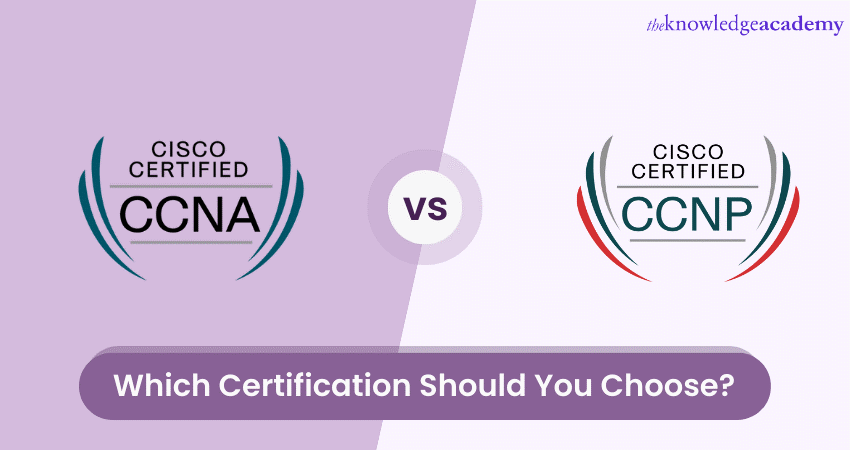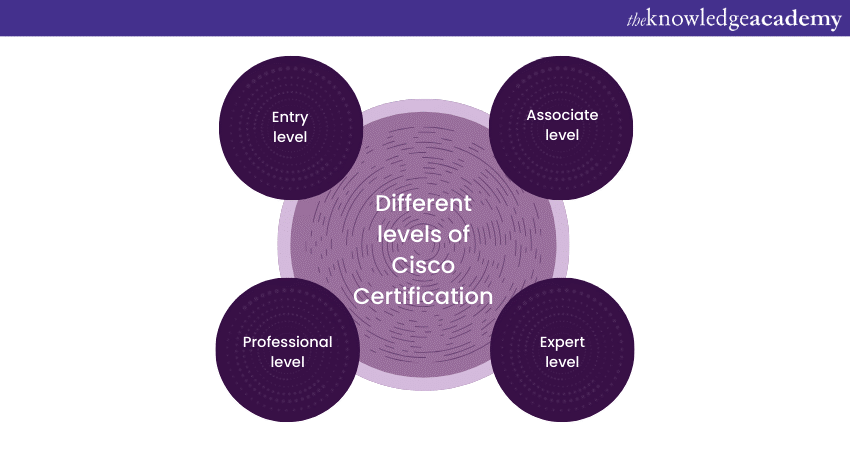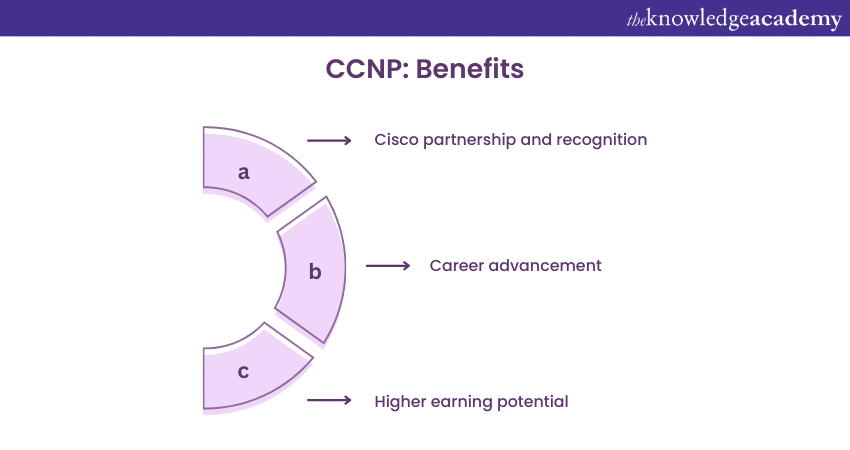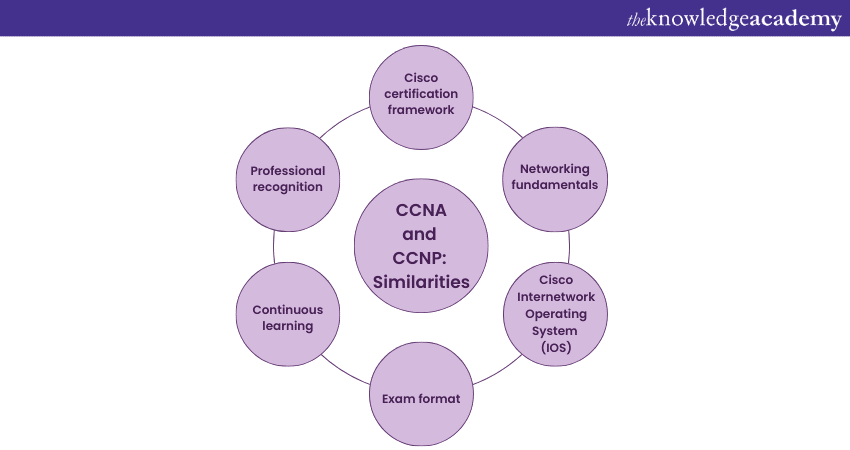We may not have the course you’re looking for. If you enquire or give us a call on + 1-866 272 8822 and speak to our training experts, we may still be able to help with your training requirements.
Training Outcomes Within Your Budget!
We ensure quality, budget-alignment, and timely delivery by our expert instructors.

Computer networks have been vital in keeping businesses, organisations, and individuals connected over the past few decades. As the demand for networking professionals rises, certifications have become a crucial benchmark for assessing an individual's knowledge and expertise. Among the numerous certifications provided by Cisco, two prominent ones are Cisco Certified Network Associate (CCNA) and Cisco Certified Network Professional (CCNP) and the CCNA vs CCNP debate has been prevalent for a while.
These certifications are widely recognised and respected within the networking industry, opening doors to rewarding job roles like Network Analyst and Systems Engineer. According to Glassdoor, the average net salary of a Network Analyst in the United Kingdom (UK) is £39,000 annually. So, it is a great career with lots of benefits. If you are interested in pursuing a career in this domain, then this blog is for you.
In this blog, we will look at the differences, similarities, and career implications of CCNA and CCNP Certifications and help you decide which certification path to choose.
Table of Contents
1) How do CCNA and CCNP fit into the Cisco Certification Training?
2) An introduction to CCNA
3) An introduction to CCNP
4) CCNA vs CCNP: Differences
5) CCNA vs CCNP: Similarities
6) Which is the right certification for you?
7) Conclusion
How do CCNA and CCNP fit into the Cisco Certification Training?
CCNA and CCNP are integral components of the Cisco certification program, which is structured into five levels: entry, associate, professional, expert, and architect. Let's explore how CCNA and CCNP fit into this certification framework.

1) Entry level: This is the foundational level of Cisco Certifications, typically designed for individuals who are new to networking. At this level, you may find certifications like the Cisco Certified Technician (CCT).
2) Associate level: CCNA Certification is the ideal certification at the associate level. It is a fundamental networking certification that covers a broad range of networking topics, making it an excellent starting point for individuals entering the field.
3) Professional level: Beyond the CCNA, you have the CCNP certification, which is part of the professional level. The CCNP Certification allows individuals to specialise in specific technology areas such as routing and switching, security, or wireless networking. It's an excellent choice for those who want to deepen their expertise in a particular domain.
4) Expert level: The expert level of Cisco Certifications includes the prestigious CCIE (Cisco Certified Internetwork Expert) Certification. CCIE is a highly advanced and respected certification in the industry, and it is often seen as the pinnacle of Cisco's Certification program. CCNP serves as a preparatory step for those who aspire to attain CCIE status.
Achieving a CCIE Certification is a significant accomplishment and demonstrates a high level of expertise and skill in Cisco networking technologies. CCIE Certifications are available in various tracks, including routing and switching, security, and data centre, among others.
Overal, CCNA serves as the associate-level certification, while CCNP is part of the professional level, offering specialised knowledge in specific technology areas. Both CCNA and CCNP can be essential stepping stones for individuals who aim to attain the highly-regarded CCIE Certification, which is recognised as a mark of excellence in the field of Cisco networking.
An introduction to CCNA
Cisco Certified Network Associate (CCNA) is an entry-level certification provided by Cisco Systems. It offers the fundamental knowledge and skills required to install, operate, and troubleshoot networks of organisations. The certification is a great launching pad for professionals looking for careers in the field of networking.
Understanding the importance of CCNA is key, as it equips, candidates are exposed to a broad range of networking concepts, protocols, and technologies. The curriculum covers essential topics that are crucial for network administrators, engineers, and technicians. These topics typically include:
1) Network fundamentals
2) Network access
3) IP connectivity
4) IP services
5) Security fundamentals
6) Automation and programmability
Benefits of CCNA Certification
Acquiring a CCNA Certification comes with multiple benefits that can help professionals in the Information Technology (IT) industry progress in their careers. Here are some of the benefits of CCNA Certification.
a) Credibility: Since it is a globally acknowledged certification and testament to having in-depth knowledge about networking and using Cisco technologies, organisations prioritise CCNA-certified candidates.
b) Improved job prospects: The certification enhances your resume and demonstrates to potential employers that you possess the essential knowledge and skills to contribute to their networking infrastructure.
c) Career advancement: The certification can open doors to higher-level networking roles within organisations. It positions individuals for career growth and provides a pathway to specialise in specific networking domains.
Take your networking skills to the next level with our CCNA Training Course (Cisco Certified Network Associate). Sign up now!
An introduction to CCNP
Cisco Certified Network Professional (CCNP) is an advanced-level certification offered by Cisco Systems. It is designed for networking professionals who have already obtained a strong foundation in networking concepts and are ready to delve deeper into specialised areas of networking.
These certifications typically require candidates to hold a valid CCNA Certification as a prerequisite. Additionally, Cisco recommends that individuals have several years of networking experience before pursuing it.
CCNP Certifications are available in various tracks, allowing individuals to focus on specific domains based on their interests and career goals. Some of the popular CCNP tracks include:
a) CCNP routing and switching: This track builds upon the routing and switching concepts covered in CCNA and explores advanced routing protocols, Multiprotocol Label Switching (MPLS), network troubleshooting, and network design principles.
b) CCNP security: This track emphasises network security concepts and technologies, including firewall configuration, Virtual Private Network (VPN) implementation, intrusion prevention systems, and identity management solutions.
c) CCNP data centre: This track focuses on data centre networking technologies, such as virtualisation, storage networking, data centre automation, and unified computing systems.
d) CCNP collaboration: This track focuses on collaboration technologies, including IP telephony, video conferencing, messaging, presence, and contact centre solutions.
Benefits of CCNP Certification

CCNP Certifications provide an opportunity for networking professionals to specialise in specific domains and acquire in-depth knowledge and expertise. Let’s look at some other benefits that come with obtaining the certification:
a) Cisco partnership and recognition: Cisco Certifications are globally recognised and respected in the networking industry. The certification showcases your commitment to professional development and dedication to mastering advanced networking skills.
b) Career advancement: Obtaining this certification opens doors to a broader range of networking roles, including network administrators, network engineers, network architects, and consultants.
c) Higher earning potential: CCNP Certified professionals often enjoy higher salaries and increased earning potential compared to those with lower-level certifications.
Elevate your networking skills with CCNP training - Cisco Certified Network Professional
CCNA vs CCNP: Differences
Both CCNA and CCNP are coveted certifications provided by Cisco Systems. But there are certain factors that differentiate them from each other. Let’s look at some of the areas or aspects where both differ:
|
Aspects |
CCNA |
CCNP |
|
Level of difficulty |
CCNA is an entry-level certification designed to provide foundational knowledge and skills. It is generally considered less challenging compared to CCNP. |
CCNP deals with advanced topics and specialised networking areas, making it more technically demanding. |
|
Career implications |
The certification serves as a starting point for many networking professionals. It enhances your employability for entry-level networking roles, such as Network Support Technicians or Junior Network Administrators. |
The certification indicates a higher level of expertise and is often associated with more senior positions, such as Network Engineers, Network Architects, or Network Consultants. |
|
Salary potential |
Since the certificate paves the way for entry-level jobs, CCNA-certified professionals will be met with lesser salaries when compared to those with a CCNP certification. |
CCNP-certified professionals generally command higher salaries. The advanced knowledge and specialisation acquired through it can lead to more lucrative job offers. |
|
Academic requirements |
The certification can be obtained upon passing a single exam – CCNA exam 200-301. |
The certification can be obtained upon passing two exams – the core exam and the concentration exam. The core exam is the 350-401 ENCOR exam. There are five concentration exams, out of which you must pass any one, alongside the core exam. |
Enhance your cybersecurity expertise with CCNP Security Training!
CCNA vs CCNP: Similarities

Although both CCNA and CCNP differ in multiple aspects, they have numerous similarities. Let's look at some of the similarities between both certifications:
a) Cisco certification framework: CCNA and CCNP certifications are part of the Cisco certification framework, which is highly recognised and respected in the networking industry. Both certifications demonstrate your proficiency in Cisco technologies and validate your skills in working with Cisco networking equipment.
b) Networking fundamentals: Both certifications require a solid understanding of networking fundamentals. While CCNA covers these concepts at an introductory level, CCNP assumes that candidates already possess a foundational knowledge of networking acquired through CCNA or equivalent experience.
c) Cisco Internetwork Operating System (IOS): Both involve hands-on experience with Cisco IOS, the operating system (OS) used on Cisco networking devices. Candidates are required to configure and troubleshoot network devices using Cisco IOS commands and features.
d) Exam format: Both certifications consist of multiple exams that candidates need to pass to obtain the certification. The exams typically assess candidates' theoretical knowledge and their ability to apply that in practical scenarios and troubleshooting situations. The exam formats may include multiple-choice questions, simulations, and hands-on lab exercises.
e) Continuous learning: Both certifications emphasise the importance of continuous learning and staying up to date with the evolving networking landscape. Cisco regularly updates its certification programs to align with industry advancements and technological changes which can be supported by studying CCNA books.
This encourages professionals holding CCNA or CCNP Certifications to engage in ongoing professional development and stay abreast of the latest networking trends and best practices.
f) Professional recognition: Both certifications are widely recognised in the industry and can enhance your professional credibility. They prove your dedication to learning and mastering networking concepts and can differentiate you from others in the job market. Employers often value candidates with CCNA or CCNP Certifications, considering them knowledgeable and skilled networking professionals
Which is the right certification for you?
Choosing the right certification between CCNA and CCNP depends on several factors, including your skill set, experience level, career goals, and the time and effort you can dedicate to preparing for the exams. Here are some guidelines to help you make an informed decision:
1) Assess your current knowledge and experience: Evaluate your existing knowledge and experience in networking. If you are new to the field or have limited experience, starting with CCNA is advisable. CCNA provides a solid foundation and ensures you have a comprehensive understanding of networking fundamentals before diving into more advanced topics covered in CCNP.
2) Determine your career goals: Consider your long-term career aspirations and the specific roles or areas of specialisation you are interested in. CCNA is suitable for individuals seeking entry-level networking positions or looking to establish a strong networking foundation.
On the other hand, if you aim to specialise in a particular domain or advance to more senior networking positions, CCNP is a better fit as it offers in-depth knowledge and expertise in specific tracks.
3) Consider time and commitment: Evaluate the time and effort you can allocate to certification preparation. CCNA typically requires less study time compared to CCNP. If you have limited availability or want to start your networking career quickly, CCNA can be a more achievable and time-efficient certification to pursue initially. CCNP, being more advanced, requires a significant investment of time and dedication to master the complex topics covered.
4) Research job requirements and market demand: Research the job market and identify the certifications in demand for your interested roles. Check job descriptions and requirements for networking positions to determine if employers prioritise CCNA or CCNP. This can help you align your certification choice with the industry demand and increase your job prospects in specific CCNA job roles.
Discover a world of opportunities in networking with Cisco Training!
Conclusion
CCNA and CCNP Certifications offer valuable benefits and can significantly enhance your networking career. The choice between both certifications, in the CCNA vs CCNP debate, depends on your current knowledge, experience, career goals, and the level of specialisation you seek. We hope this blog has helped you understand the differences between both certifications and in choosing a certificate that suits you.
Elevate your career prospects with this GNS3 Training!
Frequently Asked Questions
Upcoming IT Infrastructure & Networking Resources Batches & Dates
Date
 CCNA Certification
CCNA Certification
Mon 6th Jan 2025
Mon 17th Mar 2025
Mon 26th May 2025
Mon 14th Jul 2025
Mon 22nd Sep 2025
Mon 24th Nov 2025
Mon 8th Dec 2025







 Top Rated Course
Top Rated Course



 If you wish to make any changes to your course, please
If you wish to make any changes to your course, please


